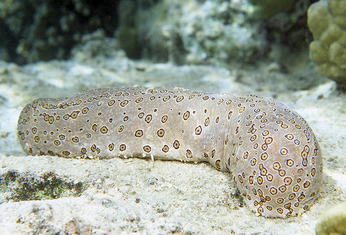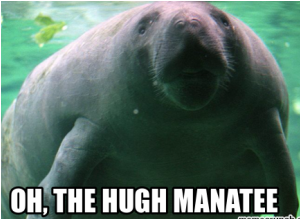 There not for eating, cooking, or scaring cats with. They are strange alien like creatures on the ocean floor! They have some unique features too,that make them extremely different from any other organism. Here is some information about this tubular cucumber: Their scientific name is Holothuroidea and they are in the echinoderm family. They're related to starfish and sea urchins. You can recognize them by there soft leathery skin. They grow from 4-12 inches long. They remind me of ocean caterpillars because their bodies are made of collagen that lets them make their body tight and loose. Many sea cucs live in shallow water on the ocean floor, while others live in the deep ocean. They can be found all over the world! Sea cucumbers are look very peculiar when they eat because they have little tube like tentacles that allow them to digest tiny particles like algae and small marine animals. They break down their food into smaller pieces and then it becomes food for other animals. They are recycling everything back into the ocean! Now thats a green cucumber! The life cycle of these bizarre oceans vegetables begins as eggs. Which soon become larvae for seventy days until they turn into small sea cucumbers. After four long years they become adults and will live for eight more years after that. That is their metamorphosis. I love these marine animals because they have the coolest adaptions that allow them to survive in the oceans. Sea cucs have respiratory trees unlike any other echinoderm. They breathe through arse, and expand and contract their bodies slowly, which brings in the water and shoots it back out. Quite peculiar but impressive. Sea cucumbers have an interesting form of self defense. When they are in danger they will discharge sticky threads to catch their enemies. They will contract their bodies and jet out some of their internal organs. Don't worry, it will all grow back! Others can even contort their bodies to defend themselves. Sea cucumber know how to take care of themselves! Here are some cool facts that I found: 1) Sea cucumbers don't have a brain but a complex nervous system. 2) Sea cucumbers don't have sensory organs, so they can only rely on instinct. 3) Some sea cucs allow tiny fish to enter and leave the arse. 4) Sea cucumbers don't use sound to communicate but they send messages using hormones. 5) Over 1250 species have been classified! Now that we all now a bit more about the sea cucumber we can learn from them and spread the message. Even though they are a bit different and even a bit weird they still deserve to be protected. And who knows, maybe they could help us too? For our oceans, sharks, and, sea cucumbers. Thank you.
0 Comments
 A pun! Finally a pun! As you may have guessed this post is about the elusive but friendly manatee. These peculiar creatures have always fascinated me. Did you know in shallow water they can use their tail to walk? Manatees are interesting animals. Here are some facts to help raise awareness about these quirky creatures: Their scientific name is Trichechus manatus and are in the Trichechidae family. There populations range from North America to the East Coast. They can live for 60-70 year. Thats probably why they have all those wrinkles. Manatees are large mammals and can reach up to 13 feet (4 meters) in length and can weigh 1,300 pounds! These gentle aquatic animals are herbivores and will eat 10-15 % of their body weight each day. That means if one manatee is 1,000 pounds they would eat 100-150 pounds of food daily! No wonder they are so heavy! Manatees are very similar to dolphins and whales. They take breathes often but can stay under the surface for 15 minutes, but when they swim, only three to four minutes. These marine mammals are slow swimmers, but they can also cruise at a stable pace at 5 miles an hour. Luckily they don't have any predators to hide from; except humans. Manatees are threatened mainly due to boating. They are killed when boat propellors hit them. They can die, get seriously injured or infected as a result. This is a serious problem and it up to us to help save them. So lets all lend a fin, and show some hugh- manatee and protect these creatures. For our oceans and sharks, thank you!  Happy new year everyone! Goodbye 2015 and hello 2016! Hooray, its the time of resolutions! I love how everybody makes choices to break bad habits and start new healthy ones. I know that I always struggle to choose just one, but my family decided to make the conscious choice to eat organic healthy foods. I am very excited about this goal because not only will I be able to eat green, but I can act green too. Locally grown foods are great for our planet. Why, might you ask? Well, when you grow organic food they never use pesticides and fertilizers which destroys any chance of water and ground contamination. It also avoids hurting animals since the plants are grown without the use of chemicals and if the organism takes a nibble nothing will affect them. Instead the farmers use a natural solution. Another fantastic advantage is that locally grown foods help stop global warming by reducing carbon emissions. Since you don't have to ship anything and all the food is at your fingertips. Now that you know the facts, you are ready to step in to the world of organic! Here are some tips to stay healthy on a budget 1.Try to buy your grub in season, it costs more to buy fruits in winter than in spring. 2.Try to freeze your goods! Then when buy your foods in season you can eat it organically all year. 3.Discover your inner chef and cook from scratch, this will allow you to know everything your putting in your body. 4. Shop near you! Try and visit your locally farmer’s market where food is inexpensive and organic! 5. Grow it yourself! Try growing your own produce in your own backyard and understand the whole process of cultivation. You don't have start right away, just try one week a month, and see how together we can cultivate a better world. Happy New Year from our Oceans and Sharks! |

Maddie Cranston,
--Ocean Warrior "We never know the worth of water till the well is dry." ~Thomas Fuller, Gnomologia, 1732 Archives
April 2018
Categories
All
|
 RSS Feed
RSS Feed
